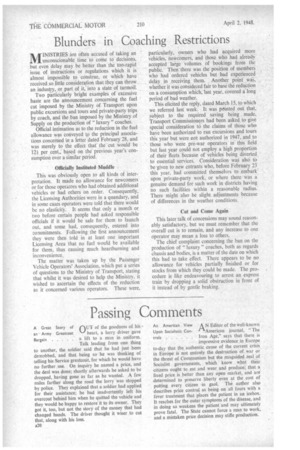Blunders in Coaching Restrictions
Page 22

If you've noticed an error in this article please click here to report it so we can fix it.
MINISTRIES are often accused of taking an unconscionable time to come to decisions, but even delay may be better than the too-rapid issue of instructions or regulations which it is almost impossible to construe, or which have received so little consideration that they can throw an industry, or part of it, into a state of turmoil. Two particularly bright examples of excessive haste are the announcement concerning the fuel cut imposed by the Ministry of Transport upon public excursions and tours and private-party trips by coach, and the ban imposed by the Ministry of Supply on the production of " luxury " coaches.
Official intimation as to the reduction in the fuel allowance was conveyed to the principal associations concerned in a letter dated February 28, and was merely to the effect that the cut would be 121 per cent., based on the previous year's consumption over a similar period.
Officially Instituted Muddle This was obviously open to all kinds of interpretation. It made no allowance for newcomers or for those operators who had obtained additional vehicles or had others on order. Consequently. the Licensing Authorities were in a quandary, and in some cases operators were told that there would be no elasticity. It seems that only a month or two before certain people had asked responsible officials if it would be safe for them to launch out, and some had, consequently, entered into commitments. Following the first announcement they were then told in at least one important Licensing Area that no fuel would be available for them, thus causing much heartburning and inconvenience.
The matter was taken up by the Passenger Vehicle Operators' Association, which put a series of questions to the Ministry of Transport, stating that whilst it was desired to help the Ministry, it wished to ascertain the effects of the reduction as it concernedvarious operators. These were, particularly, owners who had acquired more vehicles, neWcomers, and those who had already accepted large volumes of bookings from the public. Then 'there was the position of members who had ordered vehicles but had experienced delay in receiving them. Another point was whether it was considered fair to base the reduction on a consumption which, last year, covered a long period of bad weather.
This elicited the reply, dated March 15, to which we referred last week. It was painted out that, subject to the required saving being made, Transport Commissioners had been asked to give special consideration to the claims of those who have been authorized to run excursions and tours this year but were not authorized in 1947, and to those who were pre-war operators in this field but last year could not employ a high proportion of their fleets because of vehicles being diverted to essential services. Consideration was also to be 'given to new entrants who, before February 23 this year, had committed themselves to embark' upon private-party work, or where there was a genuine demand for such work in districts having no such facilities within a reasonable radius. There might also be slight adjustments because of differences in the weather conditions.
Cut and Come Again This later talk of concessions may sound reasonably satisfactory, but we must remember that the overall cut is to remain, and any increase to one operator may mean a loss to others.
The chief complaint concerning the ban on the production of " luxury " coaches, both as regards chassis and bodies, is a matter of the date on which this had to take effect. There appears to be no allowance for vehicles partially finished or for stocks from which they could be made. The procedure is like endeavouring to arrest an express train by dropping a solid obstruction in front of it instead of by gentle braking.












































































